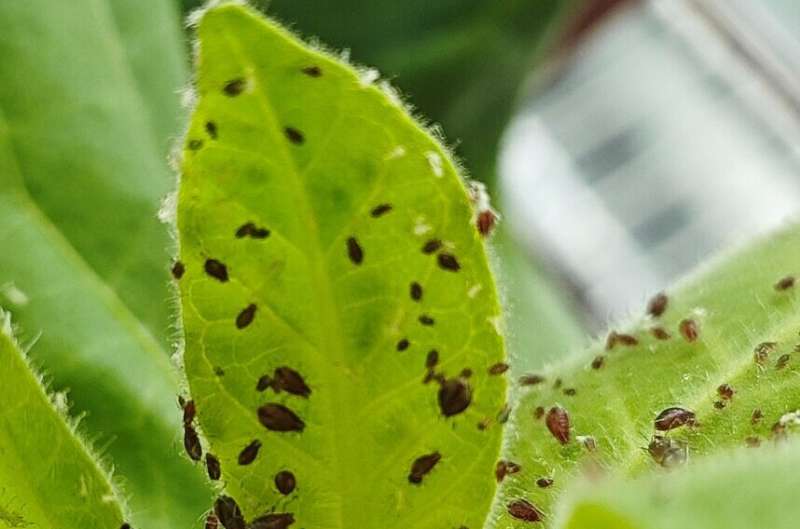This article has been reviewed according to Science X's editorial process and policies. Editors have highlighted the following attributes while ensuring the content's credibility:
fact-checked
peer-reviewed publication
trusted source
proofread
Aphid salivary protein found to promote virus infection in plants

The risk for pandemic diseases caused by arboviruses is rising as the dispersal rate of their arthropod vectors increases. During probing and feeding of arthropod vectors, vector-borne viruses are delivered into vertebrate/plant hosts together with the vector's saliva by stylet injection.
In a new study published in the Proceedings of the National Academy of Sciences, a research group led by Prof. Sun Yucheng of the Institute of Zoology of the Chinese Academy of Sciences made progress in understanding the role of vector salivary effectors in complicated virus-plant-insect vector interactions.
Aphids are by far the most important vectors of plant viruses and could transmit more than 300 viruses. They evolved specialized wing dimorphism with wingless and winged morphs under different environments. With regard to virus transmission, winged aphids are more competent vectors due to their high frequency of migration and probing.
Despite some understanding of behavioral mechanisms underlying host shifting and the mechanical inoculation by insect vectors, the genetic basis for aphid-derived effectors driving plant virus transmission is largely unknown. Previous study showed that insect vectors often deployed some salivary proteins to establish their feeding pathways within hosts and suppress host immunity in favor of feeding. However, how salivary components in vectors render viruses more infectious is poorly understood.
By using two plant viruses and their natural vector Myzus persicae and non-vector Acyrthosiphon pisum, researchers tested the hypothesis that conserved salivary proteins of vector insects can facilitate viral transmission. Revealing the crucial role of an aphid-derived effector in accelerating the post-transmission infection in plants was groundbreaking, as it significantly advanced the understanding of two distinct but interrelated aspects of vector biology.
Researchers found that a carbonic anhydrase in aphid saliva promoted the infection process of at least two aphid-transmissible non-persistent viruses in plant tissues. This effect occurs as a result of decreased apoplastic pH leading to increased vesicle trafficking. In addition, they demonstrated that this carbonic anhydrase was more highly expressed in winged aphids than wingless aphids, consistent with higher virus transmission by winged aphids.
Researchers concluded that the aphid carbonic anhydrase was crucial in shaping the outcome of plant responses to aphid and virus: detrimental to aphid feeding but beneficial to plant virus infection. This study provided vital information on targets for mitigating the spread of plant viruses and vectors.
More information: Huijuan Guo et al, Salivary carbonic anhydrase II in winged aphid morph facilitates plant infection by viruses, Proceedings of the National Academy of Sciences (2023). DOI: 10.1073/pnas.2222040120
Journal information: Proceedings of the National Academy of Sciences
Provided by Chinese Academy of Sciences
















